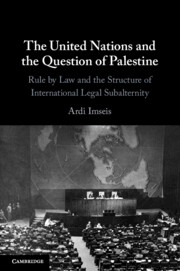 The United Nations and the Question of Palestine
The United Nations and the Question of Palestine Published online by Cambridge University Press: 16 November 2023
This chapter critically examines the distinctive institutional and normative regime created by the UN for the Palestinian refugees in the immediate aftermath of the Nakba in the form of the United Nations Conciliation Commission for Palestine and the United Nations Relief and Works Agency for Palestine Refugees in the Near East. It juxtaposes that regime against the international institutional and normative regime applicable to all other refugees in the world, as administered by the United Nations High Commissioner for Refugees. The special regime for Palestinian refugees is widely regarded as reflective of the UN’s unique responsibility for their plight. Yet, a critical examination of the UN record on the early history, mandate, and regulatory framework underpinning this regime reveals that it was never intended to give effect to Palestinian refugee rights as established under prevailing international law, including as affirmed by the UN itself. The resulting ‘protection gap’ that has consequently emerged for Palestinian refugees, marked by uneven and confused state practice concerning their plight as well as ongoing gender discrimination against them by the UN, is demonstrative of the Organization’s role in the maintenance of Palestinian legal subalternity on the international plane.
To save this book to your Kindle, first ensure [email protected] is added to your Approved Personal Document E-mail List under your Personal Document Settings on the Manage Your Content and Devices page of your Amazon account. Then enter the ‘name’ part of your Kindle email address below. Find out more about saving to your Kindle.
Note you can select to save to either the @free.kindle.com or @kindle.com variations. ‘@free.kindle.com’ emails are free but can only be saved to your device when it is connected to wi-fi. ‘@kindle.com’ emails can be delivered even when you are not connected to wi-fi, but note that service fees apply.
Find out more about the Kindle Personal Document Service.
To save content items to your account, please confirm that you agree to abide by our usage policies. If this is the first time you use this feature, you will be asked to authorise Cambridge Core to connect with your account. Find out more about saving content to Dropbox.
To save content items to your account, please confirm that you agree to abide by our usage policies. If this is the first time you use this feature, you will be asked to authorise Cambridge Core to connect with your account. Find out more about saving content to Google Drive.